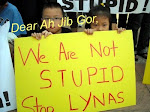Reforestation by planting rubber trees? C'mon this is called rubber plantation ok! Harvesting forest reserve for timber then planting rubber trees....this is what we called agriculture but not reforestation. Play dumb to "sapu" our natural heritage?
-------Read the report from Star---------
June 29, 2009
Chopped down in the name of reforestation
By GEETHA KRISHNAN
THE Sungai Jelok Forest Reserve in Selangor has been pillaged under the guise of reforestation and little is now left of the undulating expanse of greenery previously visible from parts of Kajang.
The obvious question is why did the previous state government gazette an area as a permanent forest reserve, only to later allow it to be violated under the excuse of harvesting the timber?
A sizeable 200ha of the 250ha forest reserve has been cleared and its precious resource of timber carted away to enrich the coffers of a few. Rubber timber clone saplings have been planted to yield another round of timber in seven years.
An area gazetted as a permanent forest reserve cannot be logged while those designated as forest reserves can have their land use changed to allow for agricultural activities or even logging.
In March, Public Accounts Committee (PAC) chairman and Kajang assemblyman Lee Kim Sin acted on a tip-off and visited the forest reserve located in the lush Hulu Langat district.
“By the time a full report was recently presented to the committee, the damage to the forest reserve was sadly beyond repair and it is contributing to the floods in Kajang.
“We are now asking the state government to terminate the agreements so the forest reserve can serve its purpose and be preserved for posterity,” he said.
As we stood in a clearing on June 24, surrounded by logs and bare terraced slopes, the drone of a chainsaw was heard in the distance.
“We are upstream and the river running below us is murky, evidence of hill clearing. The logging company has retained a narrow line of trees for the so-called buffer but this is barely sufficient to support the eco-system,” Lee said.
The report states that logging permits were issued to two private companies by the Selangor Forestry Department for a rubber estate project by the Perbadanan Kemajuan Pertanian Selangor (PKPS).
According to the report, a 25-year lease was given to two private companies to log a total of 200ha at the forest reserve. The green light was given at the state executive council meeting on May 10, 2007, and the agreements signed on July 27 of that year.
The agreement was signed based on the National Forestry Act of 1984 (Act 313) under Section 4, stating that the Forestry Director has the power “to implement forest management plans and reforestation plans”. Section 14 states that “all resources from a permanent forest reserve belong to the state”.
Lee said these loopholes had been exploited by the parties involved to further their own interests.
“Furthermore, the report reveals that both companies will pay PKPS RM15 per ha annually for the lease from Year One to 10 and RM25 per ha annually from Year 11 to 25, totalling RM105,000. The land premium to be paid is RM600 per ha, totalling RM120,000 and the land use permit is RM50,000 annually,” Lee said.
“Only 4% of the profit will be channelled back to the state government so exploitation is pretty evident.
“Moreover, a forest reserve rich with many species of trees is making way for an artificial forest, replanted with single species clones. Where is the biodiversity to ensure the survival of birds and wildlife?” he asked.
For the record, the Sungai Jelok Forest Reserve is a hilly lowland dipterocarp forest and functions as a water catchment area for Sungai Jelok, a tributary of Sungai Langat.
The question remains whether the forest reserve will be sacrificed further and left as an ugly legacy for future generations.
-------Read the report from Star---------
June 29, 2009
Chopped down in the name of reforestation
By GEETHA KRISHNAN
THE Sungai Jelok Forest Reserve in Selangor has been pillaged under the guise of reforestation and little is now left of the undulating expanse of greenery previously visible from parts of Kajang.
The obvious question is why did the previous state government gazette an area as a permanent forest reserve, only to later allow it to be violated under the excuse of harvesting the timber?
A sizeable 200ha of the 250ha forest reserve has been cleared and its precious resource of timber carted away to enrich the coffers of a few. Rubber timber clone saplings have been planted to yield another round of timber in seven years.
An area gazetted as a permanent forest reserve cannot be logged while those designated as forest reserves can have their land use changed to allow for agricultural activities or even logging.
In March, Public Accounts Committee (PAC) chairman and Kajang assemblyman Lee Kim Sin acted on a tip-off and visited the forest reserve located in the lush Hulu Langat district.
“By the time a full report was recently presented to the committee, the damage to the forest reserve was sadly beyond repair and it is contributing to the floods in Kajang.
“We are now asking the state government to terminate the agreements so the forest reserve can serve its purpose and be preserved for posterity,” he said.
As we stood in a clearing on June 24, surrounded by logs and bare terraced slopes, the drone of a chainsaw was heard in the distance.
“We are upstream and the river running below us is murky, evidence of hill clearing. The logging company has retained a narrow line of trees for the so-called buffer but this is barely sufficient to support the eco-system,” Lee said.
The report states that logging permits were issued to two private companies by the Selangor Forestry Department for a rubber estate project by the Perbadanan Kemajuan Pertanian Selangor (PKPS).
According to the report, a 25-year lease was given to two private companies to log a total of 200ha at the forest reserve. The green light was given at the state executive council meeting on May 10, 2007, and the agreements signed on July 27 of that year.
The agreement was signed based on the National Forestry Act of 1984 (Act 313) under Section 4, stating that the Forestry Director has the power “to implement forest management plans and reforestation plans”. Section 14 states that “all resources from a permanent forest reserve belong to the state”.
Lee said these loopholes had been exploited by the parties involved to further their own interests.
“Furthermore, the report reveals that both companies will pay PKPS RM15 per ha annually for the lease from Year One to 10 and RM25 per ha annually from Year 11 to 25, totalling RM105,000. The land premium to be paid is RM600 per ha, totalling RM120,000 and the land use permit is RM50,000 annually,” Lee said.
“Only 4% of the profit will be channelled back to the state government so exploitation is pretty evident.
“Moreover, a forest reserve rich with many species of trees is making way for an artificial forest, replanted with single species clones. Where is the biodiversity to ensure the survival of birds and wildlife?” he asked.
For the record, the Sungai Jelok Forest Reserve is a hilly lowland dipterocarp forest and functions as a water catchment area for Sungai Jelok, a tributary of Sungai Langat.
The question remains whether the forest reserve will be sacrificed further and left as an ugly legacy for future generations.



